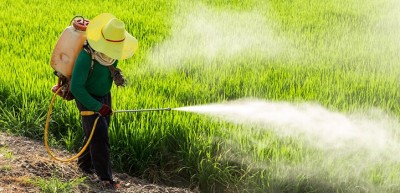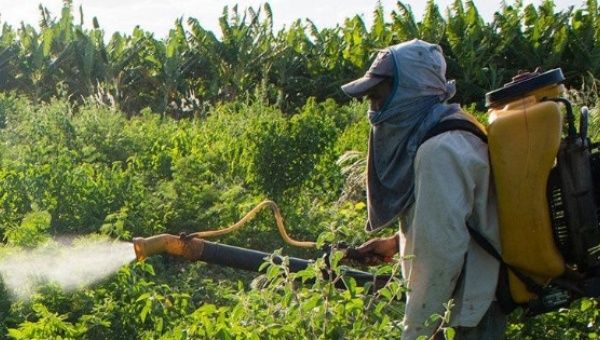Seventy Percent of Brazilian Food Contaminated by Agrochemicals
Report

A proposed law in Brazil would replace the word “pesticide” on food labels with “plant health protection.”
Around 70 percent of food consumed by Brazilians is contaminated by agrochemicals, researcher Karen Friederich of the Brazilian Association of Collective Health said Thursday.
Friederich delivered the findings of her research during a lecture at the Health Movement Forum, revealing that Brazilians consume nearly 7.5 liters of agropesticides per year—the highest per capita consumption rate in the world.
She went on to point out that at least one-third of agrochemicals used in the Brazil have been banned in the European Union and the United States due to their impacts on human health and the environment.

A worker sprays chemicals at a farm in Brazil’s Ceara state. The WHO released a report recently which found that Monsanto chemicals “probably cause cancer.” | Photo: Reuters
“The cases of contamination are not well documented, but they affect a large portion of the population, generating reproductive changes, birth defects and effects on the immune system,” Friederich stated.
Her comments come after the World Health Organization, WHO, released a report last year finding that glyphosate, a key ingredient used in many herbicides and pesticides, “probably causes cancer.”
Since 2007, when Brazil’s Health Ministry began keeping records, the number of reported cases of human intoxication by pesticides has more than doubled, from 2,178 that year to 4,537 in 2013.
Meanwhile, the annual number of deaths linked to pesticide poisoning climbed from 132 to 206. Public health specialists say the actual figures are higher because tracking is incomplete.
While speaking at the conference on Thursday, professor and scientist Leonardo Melgarejo argued that efforts to curb the use of agro-chemicals have been undermined by Brazilian lawmakers who support the interests of powerful agriculture lobby groups.
The Brazilian Congress is currently reviewing a bill that would replace the word “pesticide” with “plant health protection” on package labels, which Melgarejo argued “would increase the risks regarding the use of these substances.”
In 2014, Brazilian health agency ANVISA, which is in charge of evaluating pesticide residues in food, found that of 1,665 samples collected, ranging from rice to apples to peppers, 29 percent showed residues that either exceeded allowed levels or contained unapproved chemicals.

